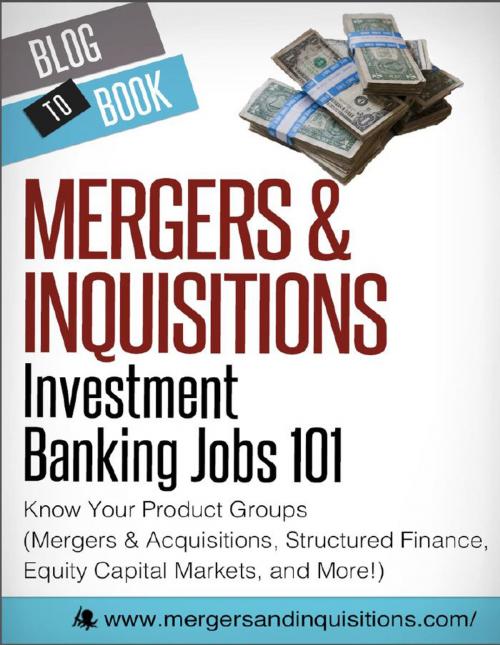Investment Banking Jobs 101: Know Your Product Groups
Business & Finance, Career Planning & Job Hunting, Entrepreneurship, Entrepreneurship & Small Business| Author: | Brian DeChesare | ISBN: | 9781614645702 |
| Publisher: | Hyperink | Publication: | August 21, 2012 |
| Imprint: | Hyperink | Language: | English |
| Author: | Brian DeChesare |
| ISBN: | 9781614645702 |
| Publisher: | Hyperink |
| Publication: | August 21, 2012 |
| Imprint: | Hyperink |
| Language: | English |
ABOUT THE BOOK
Ah, yes: the industry group vs. product group debate.
Just like the debate over cardio vs. strength training, models vs. bottles, and boutiques vs. bulge brackets, there's so much fervor on both sides that you'd almost think war was about to break out.
Actually, I lied: it's not quite that heated, but let's dive right into the debate and see what the arguments for both sides are.
Say What?
Product groups always work on a specific deal type, such as M&A or debt, across all different industries - examples include:
->Mergers & Acquisitions
->Equity Capital Markets
->Debt Capital Markets
->Leveraged Finance
->Restructuring
So if you're in the M&A group, you'll always work on acquisitions of other companies across all industries and you'll build so many merger models that you may get Excel burned into your retina.
With industry groups, by contrast, you work within one industry but on many different types of deals - equity, debt, M&A, and so on. Examples include:
->Healthcare
->Natural Resources (Oil & Gas and Mining)
->Technology, Media & Telecommunications (TMT)
->Financial Institutions Group (FIG)
->Industrials
->Real Estate Investment Banking
Pretty simple, right?
A False Dichotomy
Except that this division is wrong - or at least not 100% accurate. There are several sub-divisions of groups at a bank:
1.) Origination - These groups market and pitch for new clients, mostly for financings.
2.) Advisory - You advise companies on buying other companies. M&A. Gordon Gekko.
3.) Coverage - You do both origination and advisory work here, but you're focused on a specific sector such as industrials.
When most people talk about "industry groups," they're referring to coverage groups.
So there's more to it than the industry vs. product group distinction, and the notion that industry groups are 100% marketing and product groups are 100% execution is wrong.
EXCERPT FROM THE BOOK
Restructuring: The Hottest Group In A Cooling Economy
Whenever the economy starts sinking faster than the Titanic, you start to hear about Restructuring and Distressed M&A all the time.
Sure, everyone else is getting fired - but if you go work in one of those groups, you're guaranteed a higher bonus even as the broader market sinks, right?
Maybe, maybe not - so let's take a look at what you actually do in a Restructuring group, how you break in, and what you do next.
A Day in the Life
So what do Restructuring bankers actually do, and how does it differ from other what other investment bankers do?
The main difference is that Restructuring bankers work with distressed companies - businesses that are either going bankrupt, getting out of bankruptcy, or in the midst of bankruptcy.
When a company's business suffers and it starts heading down the path of bankruptcy, its creditors - anyone that has lent it money, whether banks, hedge funds or other institutions - immediately take notice.
A Restructuring group might be hired by a company to negotiate with its creditors and get the best deal possible, usually in the form of forgiven debt. Or they might advise a company on how best to restructure its current debt obligations either to get out of bankruptcy or to avoid it in the first place.
Another big difference is that Restructuring bankers must work within a legal framework - the Bankruptcy Code - and hence must have a more in-depth legal understanding than other bankers.
Buy the book to read more!
CHAPTER OUTLINE
Introduction
+ Industry Groups vs. Product Groups: Got Exit Opps?
Mergers & Acquisitions
+ Mergers & Acquisitions: What You Do Every Day
...and much more
ABOUT THE BOOK
Ah, yes: the industry group vs. product group debate.
Just like the debate over cardio vs. strength training, models vs. bottles, and boutiques vs. bulge brackets, there's so much fervor on both sides that you'd almost think war was about to break out.
Actually, I lied: it's not quite that heated, but let's dive right into the debate and see what the arguments for both sides are.
Say What?
Product groups always work on a specific deal type, such as M&A or debt, across all different industries - examples include:
->Mergers & Acquisitions
->Equity Capital Markets
->Debt Capital Markets
->Leveraged Finance
->Restructuring
So if you're in the M&A group, you'll always work on acquisitions of other companies across all industries and you'll build so many merger models that you may get Excel burned into your retina.
With industry groups, by contrast, you work within one industry but on many different types of deals - equity, debt, M&A, and so on. Examples include:
->Healthcare
->Natural Resources (Oil & Gas and Mining)
->Technology, Media & Telecommunications (TMT)
->Financial Institutions Group (FIG)
->Industrials
->Real Estate Investment Banking
Pretty simple, right?
A False Dichotomy
Except that this division is wrong - or at least not 100% accurate. There are several sub-divisions of groups at a bank:
1.) Origination - These groups market and pitch for new clients, mostly for financings.
2.) Advisory - You advise companies on buying other companies. M&A. Gordon Gekko.
3.) Coverage - You do both origination and advisory work here, but you're focused on a specific sector such as industrials.
When most people talk about "industry groups," they're referring to coverage groups.
So there's more to it than the industry vs. product group distinction, and the notion that industry groups are 100% marketing and product groups are 100% execution is wrong.
EXCERPT FROM THE BOOK
Restructuring: The Hottest Group In A Cooling Economy
Whenever the economy starts sinking faster than the Titanic, you start to hear about Restructuring and Distressed M&A all the time.
Sure, everyone else is getting fired - but if you go work in one of those groups, you're guaranteed a higher bonus even as the broader market sinks, right?
Maybe, maybe not - so let's take a look at what you actually do in a Restructuring group, how you break in, and what you do next.
A Day in the Life
So what do Restructuring bankers actually do, and how does it differ from other what other investment bankers do?
The main difference is that Restructuring bankers work with distressed companies - businesses that are either going bankrupt, getting out of bankruptcy, or in the midst of bankruptcy.
When a company's business suffers and it starts heading down the path of bankruptcy, its creditors - anyone that has lent it money, whether banks, hedge funds or other institutions - immediately take notice.
A Restructuring group might be hired by a company to negotiate with its creditors and get the best deal possible, usually in the form of forgiven debt. Or they might advise a company on how best to restructure its current debt obligations either to get out of bankruptcy or to avoid it in the first place.
Another big difference is that Restructuring bankers must work within a legal framework - the Bankruptcy Code - and hence must have a more in-depth legal understanding than other bankers.
Buy the book to read more!
CHAPTER OUTLINE
Introduction
+ Industry Groups vs. Product Groups: Got Exit Opps?
Mergers & Acquisitions
+ Mergers & Acquisitions: What You Do Every Day
...and much more















